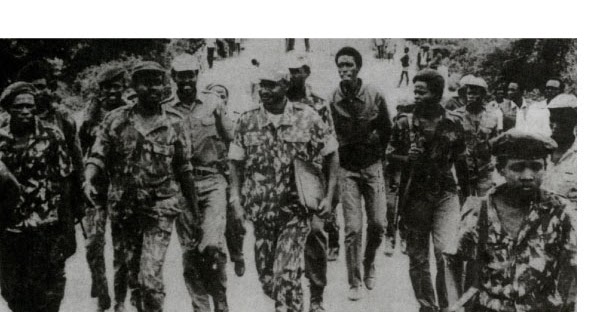The political evolution of Uganda is a tale of broken promises and unfulfilled pledges. The National Resistance Movement (NRM), under the iron-fisted rule of Yoweri Museveni, seized power in 1986 with lofty promises of liberation and democratic restoration. Yet, a forensic examination of historical records, particularly the 1995 Constituent Assembly (CA) debates, reveals a disturbing pattern of deception, manipulation, and power consolidation that has marred Uganda’s political landscape.
Lt. Col. Serwanga Lwanga’s statement on May 24, 1995, is a bombshell that exposes the NRM’s deceitful core. Lwanga candidly admitted that the idea of a transitional government limited to four years was never part of the NRM’s discussions during the Bush War. This revelation obliterates the myth that the NRM had a premeditated democratic plan. The unsigned 15-page letter cited by Budadiri East CA delegate William Wanendeya claimed Museveni promised a transitional government in 1983, yet Lwanga’s firsthand account demolishes this lie.
The glaring discrepancy between these narratives unravels the NRM’s foundational deceit. If, as Lwanga suggests, the four-year transition was an afterthought rather than a genuine commitment, then the NRM’s legitimacy is built on a foundation of lies. This raises damning questions about the integrity and intent of Museveni and his cronies during and after the Bush War.
The debate surrounding Article 85 of the 1995 draft Constitution, which led to the creation of the Electoral Commission (EC), showcases the NRM’s ruthless manipulation of democratic processes. The proposal by Patrick Mwondha to involve political parties in the appointment of EC members was a desperate plea for inclusivity and fairness. However, the NRM’s thugs shot down this motion, revealing their utter disdain for genuine democratic participation.
By insisting that the President alone appoint EC members with parliamentary approval, the NRM centralized power, trampling on the democratic principle of checks and balances. The argument against Mwondha’s proposal, suggesting that consulting political parties would necessitate including other interest groups, was a smokescreen. It obscured the critical issue: the need for an impartial and representative electoral body. The defeat of Mwondha’s motion ensured that the EC remained under the executive’s thumb, compromising its independence. This strategic control over the electoral body has perpetuated electoral fraud, casting a long shadow over Uganda’s democratic processes.
The CA debates in May 1995 also highlighted the NRM’s blatant betrayal regarding Uganda’s political transition. The proposal by Jaberi Bidandi Ssali and Lt. Col. Serwanga Lwanga to end the Movement system two years after the first election under the new Constitution was a courageous step towards multiparty democracy. However, the NRM’s power-hungry operatives crushed this proposal.
Amendments sponsored by John Patrick Amama Mbabazi and Kahinda Otafiire further entrenched the Movement system, ensuring its continuation for five more years and keeping political parties in the deep freeze. These amendments were not about national stability but about solidifying the NRM’s stranglehold on power. The CA’s Select Committee Five’s decision to hold a referendum in the fifth year to decide on the political system was a sham. It was a strategic delay, allowing the NRM to tighten its grip on power. The insistence that the Movement system would remain until the referendum rendered the promise of a quick return to multiparty politics a grotesque joke.
The broader implications of these debates and amendments reveal a diabolical effort by the NRM to cement its dominance. The initial promise of a four-year transition to an elected government was a sinister ploy, as evidenced by Lwanga’s revelations and the subsequent political machinations. The creation of an EC under executive control and the deliberate stifling of multiparty politics through constitutional amendments expose a pattern of cold-blooded manipulation aimed at consolidating power rather than fostering genuine democratic governance.
This pattern is not unique to the 1995 debates. It has been a defining feature of the NRM’s tyrannical rule. For instance, the 2005 referendum, which purported to open the political space for multiparty competition, came after almost two decades of NRM consolidation. Even then, the political landscape remained a minefield for opposition parties, facing relentless legal and extralegal hurdles.
The events and debates of 1995 serve as a damning indictment of the NRM’s legacy. The contradictions between the NRM’s promises and actions reveal a leadership obsessed with maintaining power at any cost. Lt. Col. Serwanga Lwanga’s candid admission about the non-discussion of a four-year transition during the Bush War is a chilling reminder of the NRM’s deceitful nature.
The manipulation of the electoral process and the deliberate suppression of multiparty politics illustrate a broader strategy of ruthless control and dominance. These actions have had devastating implications for Uganda’s democratic trajectory, creating a political environment where genuine opposition is systematically crushed.
As Uganda grapples with its political future, the lessons from 1995 are starkly relevant. They highlight the urgent need for vigilance and critical engagement with political narratives, ensuring that promises of democratic governance are not mere rhetoric but are backed by genuine commitment and action. The NRM’s legacy, as revealed through these historical accounts, is a harrowing tale of the dangers of unchecked political power and the enduring struggle for true democratic governance in Uganda. The NRM, under Museveni, has been a blight on Uganda’s democratic aspirations, a malevolent force that has systematically undermined the very principles it once claimed to uphold.







Discussion about this post